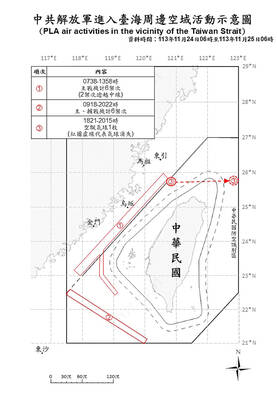A majority of Taiwanese have multiple self-identities, a phenomenon which has been consistent since 2008, but an increasing number of young people identify themselves with China, a survey has found.
The Taiwan Indicator Survey Research (TISR) examined the attitude of Taiwanese toward themselves and China with the survey and found that their views have not changed much.
In a question on self-identity that allowed respondents make multiple choices, 95.5 percent of those who polled said they viewed themselves as Taiwanese and 82.2 percent said they were from the Republic of China (ROC).
The top two self-identifications were followed by 75.1 percent of respondents who said they belonged to Zhonghua Minzu (中華民族), 70.9 percent who said they were Asians and 68 percent saying they were Hua people (華人).
Forty-four percent of respondents identified themselves as Chinese and 9.4 percent identified themselves as “members of the People’s Republic of China (PRC).”
While the results were similar to those in a previous survey in September 2008, TISR general manager Tai Li-an (戴立安) said in a press release it showed that more than one-fifth of the 20-24 age group identified with the PRC — the highest number among all age groups.
“It remains to be seen whether self-identification among [youth] is now more diverse with relaxed cross-strait relations,” Tai said.
Meanwhile, asked what cross-strait relations would eventually resemble, 39.2 percent of respondents envisioned China as a “business partner” and 19.4 percent said Beijing would be a “friend.”
Only 7.7 percent regarded China as an enemy, with 7.3 percent saying China is a “family member” and 6.7 percent saying it is a “relative.”
However, the percentage of respondents who regarded Beijing as trading partners dropped by 4.9 percent, despite Taiwan and China inking an investment protection agreement recently, said Tai.
The survey also found that 50.2 percent of respondents viewed the Beijing government as “unfriendly” toward Taiwanese, up 12.3 percent since 2008, while 32.8 percent saw China as friendly, down 6.2 percent from four years ago.
Despite Taiwan and China signing 18 agreements in recent years, 56.9 percent of respondents said their impression of China’s government remained unchanged, with 25.7 percent saying the Beijing has left them with a better impression than before and 3.7 percent saying the impression had worsened.
The poll, conducted between Tuesday and Thursday last week, collected 1,007 valid samples and had a 3.1 percent margin of error.

A decision to describe a Chinese Ministry of Foreign Affairs statement on Singapore’s Taiwan policy as “erroneous” was made because the city-state has its own “one China policy” and has not followed Beijing’s “one China principle,” Deputy Minister of Foreign Affairs Tien Chung-kwang (田中光) said yesterday. It has been a longstanding practice for the People’s Republic of China (PRC) to speak on other countries’ behalf concerning Taiwan, Tien said. The latest example was a statement issued by the PRC after a meeting between Singaporean Prime Minister Lawrence Wong (黃循財) and Chinese President Xi Jinping (習近平) on the sidelines of the APEC summit

Taiwan’s passport ranked 34th in the world, with access to 141 visa-free destinations, according to the latest update to the Henley Passport Index released today. The index put together by Henley & Partners ranks 199 passports globally based on the number of destinations holders can access without a visa out of 227, and is updated monthly. The 141 visa-free destinations for Taiwanese passport holders are a slight decrease from last year, when holders had access to 145 destinations. Botswana and Columbia are among the countries that have recently ended visa-free status for Taiwanese after “bowing to pressure from the Chinese government,” the Ministry

HEALTHCARE: Following a 2022 Constitutional Court ruling, Taiwanese traveling overseas for six months would no longer be able to suspend their insurance Measures allowing people to suspend National Health Insurance (NHI) services if they plan to leave the country for six months would be abolished starting Dec. 23, NHIA Director-General Shih Chung-liang (石崇良) said yesterday. The decision followed the Constitutional Court’s ruling in 2022 that the regulation was unconstitutional and that it would invalidate the regulation automatically unless the NHIA amended it to conform with the Constitution. The agency would amend the regulations to remove the articles and sections that allow the suspension of NHI services, and also introduce provisional clauses for those who suspended their NHI services before Dec. 23, Shih said. According to

‘GRAY ZONE’ TACTICS: China continues to build up its military capacity while regularly deploying jets and warships around Taiwan, with the latest balloon spotted on Sunday The US is drawing up contingency plans for military deployments in Japan and the Philippines in case of a Taiwan emergency, Japan’s Kyodo news agency reported. They would be incorporated in a first joint operation plan to be formulated in December, Kyodo reported late on Sunday, citing sources familiar with Japan-US relations. A US Marine Corps regiment that possesses High Mobility Artillery Rocket Systems — a light multiple rocket launcher — would be deployed along the Nansei Island chain stretching from Kyushu to Yonaguni near Taiwan, Kyodo said. According to US military guidelines for dispatching marines in small formations to several locations,